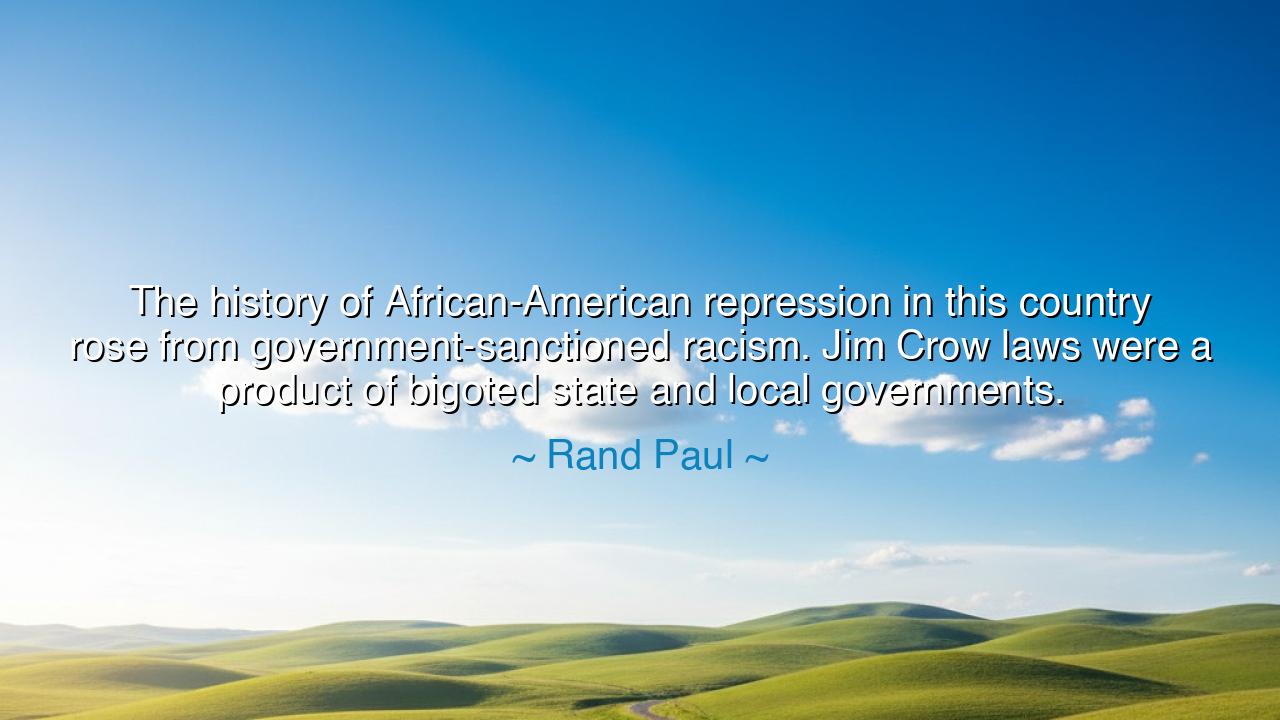
The history of African-American repression in this country rose
The history of African-American repression in this country rose from government-sanctioned racism. Jim Crow laws were a product of bigoted state and local governments.






In the words of Rand Paul, spoken not as mere commentary but as a reckoning with history, we hear a truth both painful and necessary: “The history of African-American repression in this country rose from government-sanctioned racism. Jim Crow laws were a product of bigoted state and local governments.” These words, clear and sharp as a chisel, strike against the stone of forgetfulness. They remind us that oppression does not always come from mobs or from individuals, but from the very structures that claim to uphold justice. When government — the instrument of order and protection — turns its face toward hatred, injustice gains the weight of law, and cruelty wears the crown of authority.
The origin of this reflection lies in the long and bitter history of African-American repression in the United States. After the end of slavery — a moment that should have marked the dawn of freedom — the shadows of bondage merely changed their form. The Jim Crow laws, born in the ashes of Reconstruction, sought to rebuild chains not of iron, but of policy and power. Through segregated schools, unequal facilities, and laws that denied voting rights, the governments of the South — local and state alike — codified prejudice into law. The hand of racism became the hand of the state, and for generations, Black Americans were told, by decree and by punishment, that they were not equal citizens of the land their labor had built.
Paul’s words remind us that racism, when sanctified by law, becomes more than personal sin; it becomes a systemic poison. It seeps into the courts, the schools, the streets — until even the air a person breathes is tainted with inequality. The Jim Crow era was not chaos; it was order — a cruel, deliberate order. It was not the work of the ignorant alone, but of lawmakers, governors, and judges who cloaked hatred in legality. It is this truth that demands our remembrance: that injustice, when written into law, becomes harder to fight, for it hides behind the mask of legitimacy.
Consider the story of Rosa Parks, who in 1955 refused to give up her seat to a white passenger on a Montgomery bus. Her defiance was not against a rude driver or a passing insult — it was against a law, a municipal code that declared segregation the will of the state. When Parks was arrested, the law was technically upheld. But in that moment, the moral law of the universe — the law of equality, dignity, and human worth — began to rise against the false law of man. Her quiet act, and the movement that followed, revealed the rot beneath the surface of legality. It showed that when law serves hate, resistance becomes not rebellion, but righteousness.
Paul’s acknowledgment of government-sanctioned racism forces us to confront an uncomfortable truth: the instruments of power that can protect liberty can also destroy it. The same hands that draft constitutions can also draft chains. The Jim Crow era teaches that when vigilance sleeps, freedom decays — that democracy without moral conscience becomes tyranny disguised as order. The evil of those times was not just in the hearts of individuals, but in the policies they upheld. To forget this is to invite history to repeat its cruelest lessons.
And yet, there is redemption in recognition. To speak truth, as Rand Paul does, is to begin the work of healing. For acknowledgment is the first act of justice. We cannot cleanse what we refuse to see, nor rebuild what we deny was broken. The struggle for civil rights — from the courage of Frederick Douglass to the dreams of Martin Luther King Jr. — has always been not only a fight against men, but against the corrupted laws of men. Their battle was not simply for freedom of body, but for the sanctification of the law itself — to make the written word of government reflect the eternal truth of equality.
Therefore, my child of the present age, take this teaching to heart: the greatest danger to freedom is not chaos, but complacency — not open hatred, but the silence that allows hatred to rule through law. Be vigilant against any system, policy, or institution that elevates one people over another. Let justice be your measure, not tradition; let compassion be your constitution. The law must serve the human spirit, not enslave it.
For as Rand Paul reminds us, history’s darkest chapters were written not by the wild hand of anarchy, but by the steady hand of governance. To ensure that such shadows never rise again, each generation must become the guardian of its own justice. Remember this: when power serves truth, it heals the world; but when it serves prejudice, it wounds the soul of a nation. Let your work, your vote, your words, and your conscience be the instruments that ensure space for freedom, equality, and dignity for all — the true design of a just and moral world.






AAdministratorAdministrator
Welcome, honored guests. Please leave a comment, we will respond soon